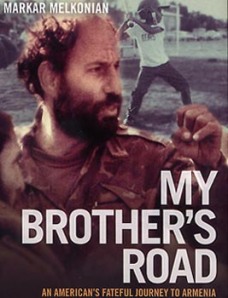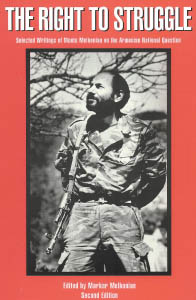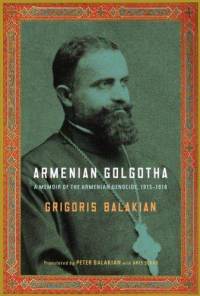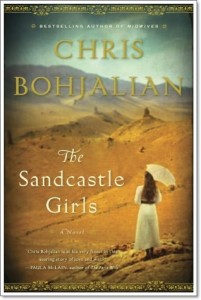Summer Reading List
July 17, 2012By: Christine Feghali
One of my favorite things about summer is finally being able to relax and work on decreasing the number of unread books on my bookshelf. Seeing as I have well over 100 books, my biggest challenge is trying to figure out which book to read next.
I figured that there might be a large number of people looking for the next great read and I intend to provide an incomplete list of books that focus on Armenian history and Armenian struggles that will make your summer more fulfilling. Full disclosure: I have not read all of the following books (although I plan to), but I have reliable sources.
 One of my favorite books is My Brother’s Road. Written by Markar Melkonian, the book is a biography of Monte Melkonian’s short, yet inspirational life. Many of us can relate to Monte’s early life. He grew up in central California with little knowledge of his ancestry or of the Armenian language. As he began to learn more about our history and of our cause, he became increasingly involved in ensuring justice was served. Monte died a national hero – this book tells his story. This book is very well written and allows the reader to see the kind of person Monte was. I refrained form reading the last couple of chapters for over a month because I know of Monte’s fate and knew I would get too emotional reading the end.
One of my favorite books is My Brother’s Road. Written by Markar Melkonian, the book is a biography of Monte Melkonian’s short, yet inspirational life. Many of us can relate to Monte’s early life. He grew up in central California with little knowledge of his ancestry or of the Armenian language. As he began to learn more about our history and of our cause, he became increasingly involved in ensuring justice was served. Monte died a national hero – this book tells his story. This book is very well written and allows the reader to see the kind of person Monte was. I refrained form reading the last couple of chapters for over a month because I know of Monte’s fate and knew I would get too emotional reading the end.
If My Brother’s Road sparked your interest, I highly recommend reading The Right to Struggle.  The book is a compilation of Monte’s personal writings. The topics range from the more neutral, such as Armenian history and the Diaspora, to quite controversial, such as criticisms of the Armenian Revolutionary Federation. Because the book is made up of passages Monte wrote himself, whether you agree with him or not, you experience Monte’s thought process as he was fighting against our enemies in Artsakh.
The book is a compilation of Monte’s personal writings. The topics range from the more neutral, such as Armenian history and the Diaspora, to quite controversial, such as criticisms of the Armenian Revolutionary Federation. Because the book is made up of passages Monte wrote himself, whether you agree with him or not, you experience Monte’s thought process as he was fighting against our enemies in Artsakh.
Armenian Golgotha, originally published in 1922 and later translated into English, is Father Grigoris Balakian’s  horrifying first-hand account of the Armenian Genocide. Balakian was one of the 250 leading figures that were arrested and deported on April 24, 1915. The book is a gruesome account of the cruelties that he and many of our family members endured over the next three years. He was able to escape arrest and lived over two years of his life disguised as numerous people until he was able to return to Constantinople and write about what he witnessed. I will warn you, this book is quite graphic and will make even the most stoic person get teary-eyed. However, this should not deter you from reading Armenian Golgotha. I urge you to read this book. If you were apathetic towards our cause before, this book will ensure that you revisit your heritage and remember our cause.
horrifying first-hand account of the Armenian Genocide. Balakian was one of the 250 leading figures that were arrested and deported on April 24, 1915. The book is a gruesome account of the cruelties that he and many of our family members endured over the next three years. He was able to escape arrest and lived over two years of his life disguised as numerous people until he was able to return to Constantinople and write about what he witnessed. I will warn you, this book is quite graphic and will make even the most stoic person get teary-eyed. However, this should not deter you from reading Armenian Golgotha. I urge you to read this book. If you were apathetic towards our cause before, this book will ensure that you revisit your heritage and remember our cause.
Peter Balakian, one of the editors of Armenian Golgotha, also wrote Black Dog of Fate: A Memoir and The Burning Tigris. The first book is a somewhat autobiographical novel that describes what growing up outside of the Motherland was like and how and why the Armenian Genocide still affects the Armenian Diaspora so strongly. The latter book contains archival documents and first-person accounts of how the Turkish government implemented the Genocide and hid it behind World War One, of how our ancestors were treated, and of how America responded to the Genocide. Both books are definitely worth the time!
As Armenians, it’s easy to say that all Turks are inherently bad because of what they did beginning 97 years, 2 months, and  23 days ago, and their 35,514 days or 852,336 hours of denial (yes, I know Armenians were being murdered before April 24, 1915, but as that is the generally accepted date for the first day of the Genocide, it is what I’m basing my numbers on). There are, however, some people in Turkey who recognize what their country is responsible for. Turkish historian Taner Akcam uses military and court records, parliamentary minutes, eyewitness reports, and other previously unused official documents to reconstruct the planning and implementation of the Genocide and the multiple failures to bring justice to the perpetrators. The book is titled A Shameful Act: The Armenian Genocide and the Question of Turkish Responsibility. Akcam is one of the first Turkish academics to acknowledge and openly discuss the Armenian Genocide and has faced a great deal of harassment from his peers and from the Turkish authorities.
23 days ago, and their 35,514 days or 852,336 hours of denial (yes, I know Armenians were being murdered before April 24, 1915, but as that is the generally accepted date for the first day of the Genocide, it is what I’m basing my numbers on). There are, however, some people in Turkey who recognize what their country is responsible for. Turkish historian Taner Akcam uses military and court records, parliamentary minutes, eyewitness reports, and other previously unused official documents to reconstruct the planning and implementation of the Genocide and the multiple failures to bring justice to the perpetrators. The book is titled A Shameful Act: The Armenian Genocide and the Question of Turkish Responsibility. Akcam is one of the first Turkish academics to acknowledge and openly discuss the Armenian Genocide and has faced a great deal of harassment from his peers and from the Turkish authorities.
 I realize that some of you may be looking for a novel that is less data dense and more character driven and for you, I suggest Chris Bohjalian’s new book The Sandcastle Girls. Although the book is a work of fiction, it is based on our tragic history and the struggles of our people. Bohjalian is a New York Times best selling author and this book is his fifteenth novel. The book is a story about a young American woman who goes to Syria to provide medical aid and deliver food to refugees from the Armenian Genocide. There, she meets a young Armenian man who had lost his wife and infant daughter in the Genocide. The young American woman and the Armenian man fall in love. The story bounces back and forth between the past and the present to tell the tragic story of an Armenian Genocide survivor and his family’s life after the Genocide. Partially based on Chris Bohjalian’s own family history, The Sandcastle Girls is a war epic and an emotional love story that focuses on the Armenian Genocide and Armenian identity.
I realize that some of you may be looking for a novel that is less data dense and more character driven and for you, I suggest Chris Bohjalian’s new book The Sandcastle Girls. Although the book is a work of fiction, it is based on our tragic history and the struggles of our people. Bohjalian is a New York Times best selling author and this book is his fifteenth novel. The book is a story about a young American woman who goes to Syria to provide medical aid and deliver food to refugees from the Armenian Genocide. There, she meets a young Armenian man who had lost his wife and infant daughter in the Genocide. The young American woman and the Armenian man fall in love. The story bounces back and forth between the past and the present to tell the tragic story of an Armenian Genocide survivor and his family’s life after the Genocide. Partially based on Chris Bohjalian’s own family history, The Sandcastle Girls is a war epic and an emotional love story that focuses on the Armenian Genocide and Armenian identity.
This list is definitely incomplete, but it should be enough to keep you busy over the summer. I invite you readers to add to this list by listing your favorite books that are about Armenians in the comments section of this blog.